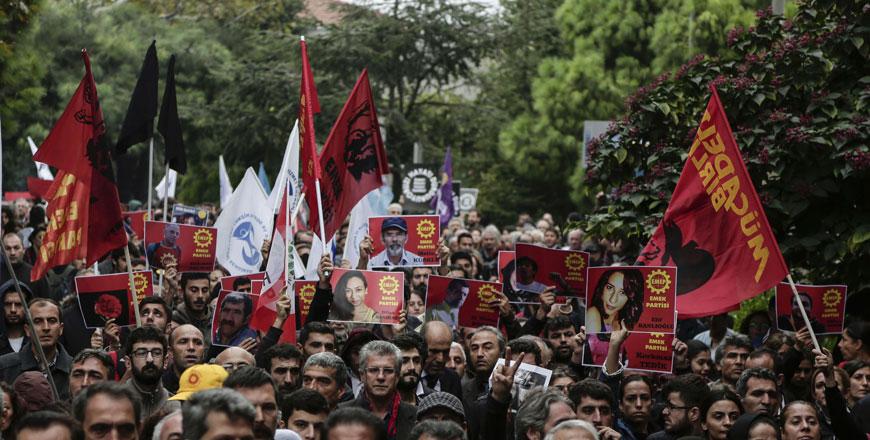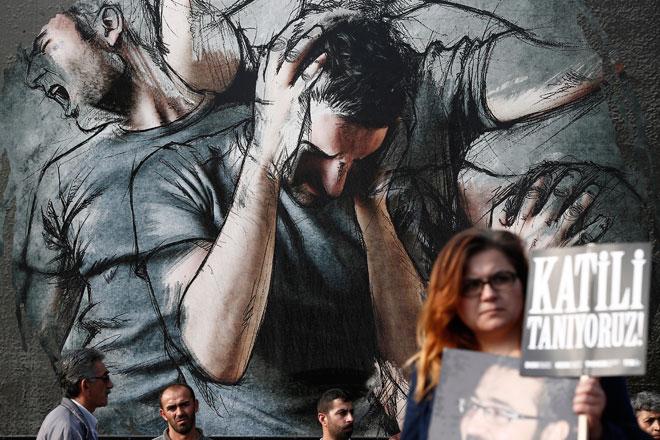You are here
Investigators focus on home-grown Daesh cell in Turkey bomb probe
By Reuters - Oct 13,2015 - Last updated at Oct 13,2015

Protesters shout slogans and hold placards featuring images of party members who were killed in the deadly attacks in Ankara, during a demonstration on Tuesday in Istanbul (AFP photo)
ISTANBUL/ANKARA — Turkish investigators believe a Daesh cell from the southeastern town of Adiyaman, thought to have been behind previous attacks in the country, may have carried out a double suicide bombing that killed 97 people in the capital Ankara.
Turkey's Human Rights Association said several families from the town had approached authorities in recent years expressing concern their sons could have left to join Daesh in Syria. It said there had been no proper investigation.
Two bombs exploded seconds apart on Saturday, targeting a rally of pro-Kurdish activists and civic groups near Ankara's main train station, three weeks ahead of a general election.
It was the worst attack of its kind in Turkish history, triggering protests against what critics of President Recep Tayyip Erdogan and the government see as a major intelligence failure.
Prime Minister Ahmet Davutoglu said on Monday Daesh was the prime suspect. Officials in Ankara said they were focusing on the so-called "Adiyaman cell" — a group of Turks, some of whom had travelled to Syria, and who were thought also to have been behind a suicide bombing in July in the town of Suruc near the Syrian border, which killed 34 people.
The cell is also believed to have been involved in the bombing of a pro-Kurdish opposition rally in the southeastern town of Diyarbakir on the eve of Turkey's last election in June.
"There is a possibility that someone from the Adiyaman group might have been responsible [for the Ankara bombing]," one senior government official told Reuters, speaking on condition of anonymity because of the sensitivity of the investigation.
"Investigations are still ongoing. We have a few suspects and names... DNA samples have been taken from some families and we will try to match them. The bombers' names will be revealed before long," the official said.
The possibility that a group known to the authorities carried out Saturday's attack has heaped pressure on the government, already under fire from opponents for failing to give more transparent information on its investigations into the Diyarbakir and Suruc attacks.
Osman Suzen, head of the Adiyaman branch of Turkey's Human Rights Association, said several families from the town had reported to the authorities concerns about their sons leaving to join Daesh in Syria in recent years.
"Several families appealed to the authorities... saying their sons are missing and they suspect they went to Syria and joined Islamic State [Daesh]," Suzen told Reuters.
"This problem has been around since 2013 and no proper or effective investigation has so far been made," he said.
Details of the investigations into the Diyarbakir and Suruc bombings have never been made public and are subject to reporting restrictions under Turkish law. Police and security officials could not immediately be reached for comment.
Vulnerability
Turkey is vulnerable to infiltration by Daesh, which holds swathes of Syrian land abutting Turkey where some two million refugees live. But there has been no word from the group — usually swift to publicly claim responsibility for any attack it conducts — over the Ankara, Diyarbakir or Suruc bombings.
The pro-Kurdish Peoples' Democratic Party (HDP), which says it was the target of the Ankara bombings, has said President Erdogan and the government have blood on their hands.
"This attack happened because none of the necessary steps were taken after the previous ones. We wouldn't have lost so many of our people," HDP spokesman Ayhan Bilgen said.
Government officials reject any suggestion that the are failing to fully investigate any of the attacks. They say forensic evidence has been gathered, a list of suspects identified and that announcements will be made quickly.
But critics say Turkey has been slow to wake up to the home-grown threat it faces from Daesh. Thousands of foreign fighters, including Turks, crossed the border into Syria to join the ranks of the radical group, a flow Turkey has only recently brought under control.
The Radikal newspaper said on Tuesday police had identified 21 suspected Daesh militants, six of them women, believed to be preparing an attack in Turkey. It said 18 of them were from Adiyaman.
Related Articles
ISTANBUL — Turkish prosecutors said Monday they had remanded four people in custody over a deadly Ankara attack, as the identity of one of t
ANKARA — Kurdish militants on Wednesday claimed the murder of two Turkish police officers as revenge for a deadly suicide bombing near the S
ISTANBUL — President Recep Tayyip Erdogan said on Thursday Syrian intelligence and Kurdish militants, not just Daesh, were behind a double s















